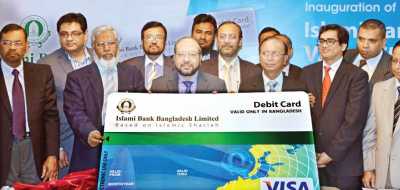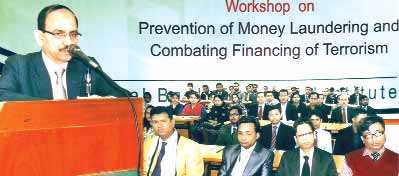IBBL launches VISA Debit Card

Islami Bank Bangladesh Limited announced the launch of its next generation Islami Bank VISA Debit Card to the customers.
Dasgupta Asim Kumar, Executive Director, Bangladesh Bank, inaugurated the launch of the card as chief guest at a hotel in Dhaka on Wednesday.
Banks asked not to cut stock market exposure drastically
The suggestion came at the bankers’ meeting at the central bank headquarters in Dhaka
Bangladesh Bank yesterday asked the commercial banks to bring down their capital market exposure gradually in line with the law so the stock market does not see drastic fall.
The suggestion came at the bankers’ meeting at the central bank headquarters in Dhaka.
“The banks have been asked to cut their capital market exposure gradually within three years. Because if they cut their investment at a time after three years, then capital market might face freefall,” Deputy Governor SK Sur Chowdhury told reporters after the meeting.
Pointing fingers at the share market debacle in late 2010, he said banks should be careful in share market investment so that history of debacle is not repeated.
Pubali Bank Managing Director Helal Ahmed Chowdhury said the central bank asked not to go for drastic share sale and also to keep support to the capital market’s stability.
In September 2013, the BB directed the commercial banks will have to reduce their capital market exposure to 25% of their equity by July 2016 in accordance with the new bank company law.
The directive came two months after the parliament passed the Bank Company (amendment) Act.
Under the law, the banks still having higher exposure to the stock market will have to reduce it to 25% of their paid-up capital, reserve, retained earnings and share premium.
During calculation of their total investment in stocks, the banks will have to take elements like all kind of shares, debenture, corporate bonds, mutual fund units and other securities into account.
Banks will have to follow all necessary banking rules and regulations in lending credit to their subsidiary companies like brokerage firm, merchant bank and other similar institutions.
After the present government’s assuming power in 2009, the stock market showed a bullish trend and many banks invested beyond their limits. But after a price debacle in late 2010, the banks’
huge exposure came under criticism from various quarters. The International Monetary Fund and the Asian Development Bank recommended that the banks’ investment in the capital market should be 25% of their equities instead of deposits (liabilities).
News:Dhaka Tribune/19-Feb-2014Training course of RAKUB concluded
.jpg)
A six-week-long foundation training course of Rajshahi Krishi Unnayan Bank (RAKUB) concluded at the bank’s Training Institute in Rajshahi on Monday.
Professor Dr. M Shah Nowaz Ali, Chairman of the bank, handed over certificates among the trainees of the bank’s newly recruited officers at the function, said a press release.
State banks' excess liquidity to be invested in treasury bonds
The government has taken initiative to sell treasury bonds and bills to the state-owned commercial banks in a long-term investment of the banks’ excess liquidity.
Bank and Financial Institutions Division made the decision at a meeting held on February 12. Additional secretary to the Division Amalendu Mukherjee presided over the meeting attended by the chairmen and managing directors of the Sonali, Janata, Agrani and Rupali banks.
The banking division also asked the management of the state-owned commercial banks to submit the papers on amounts of the excess liquidity, said the meeting sources.
The excess liquidity of the four banks may exceed Tk5000 crore.
However, a top official of a bank differed with the long-term investment of the excess liquidity.
Another high official said the excess liquidity had already been invested in the call money market, “so there is no excess liquidity in the banks.”
“There is some excess liquidity in the state-owned commercial banks due to a seven-month political unrest. The demand of loan fell,” said Dr Khandoker Bazlul Haque, chairman of the Agrani Bank, told the Dhaka Tribune.
He said the demand of loan will rise after the upazila elections and there would be no excess liquidity then. According to him, the liquidity should not be invested in treasury bills and bonds as “the interest rate is below 10% while the cost of fund is 15%.”
News:Dhaka Tribune/19-Feb-2014
NBL workshop on anti-money laundering held

National Bank Training Institute (NBTI) recently organised a day-long workshop on Prevention of Money Laundering and Combating Financing of Terrorism.
NBTI also holds a two-week-long “Foundation Training Course for Junior Officers (General)” of the bank, said a press release.



